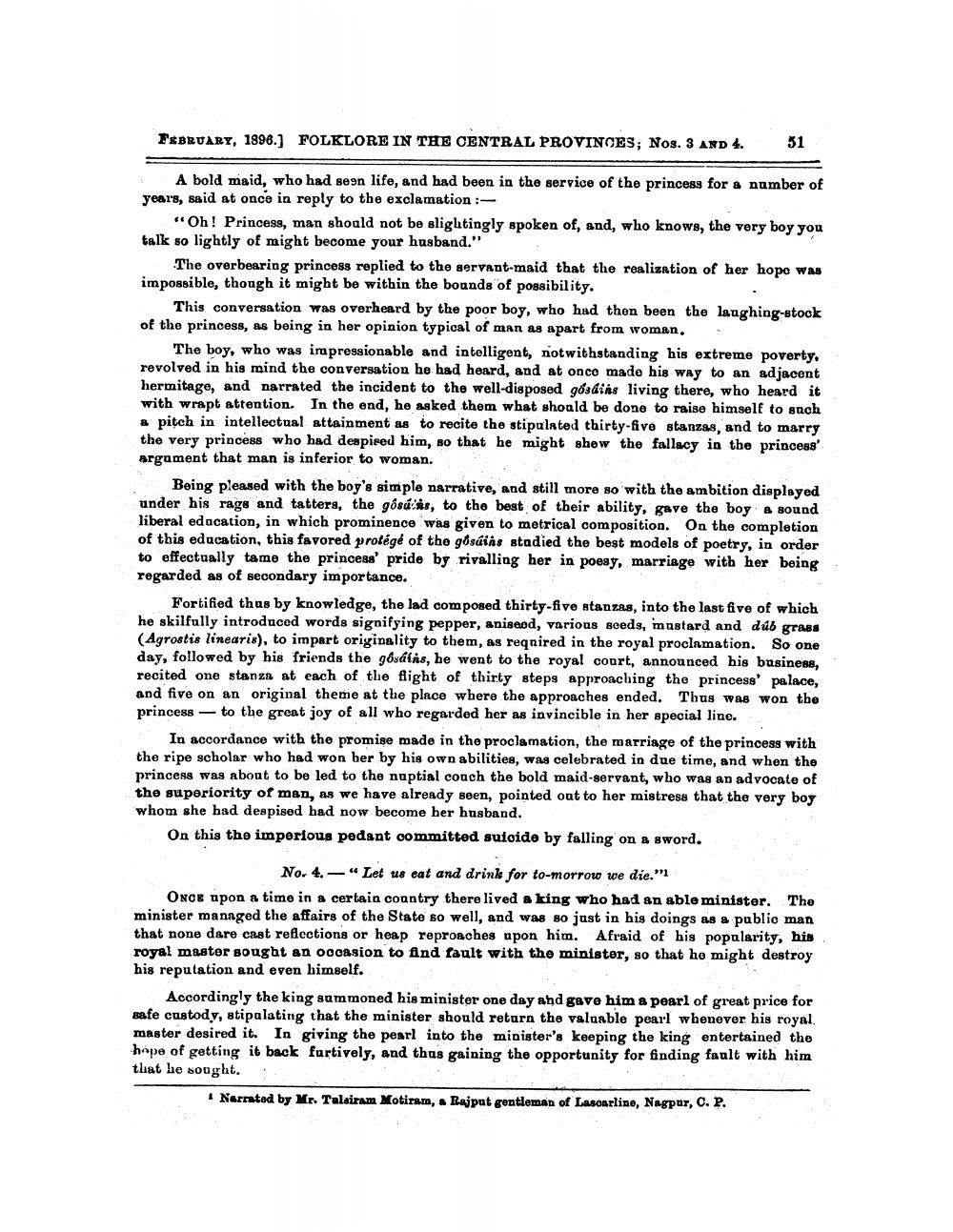________________
FEBRUARY, 1996.] FOLKLORE IN THE CENTRAL PROVINCES; Nos. 3 AND 4. 51
A bold maid, who had seen life, and had been in the service of the princess for a number of years, said at once in reply to the exclamation:
"Oh! Princess, man should not be slightingly spoken of, and, who knows, the very boy you talk so lightly of might become your husband."
The overbearing princess replied to the servant-maid that the realization of her hope was impossible, though it might be within the bounds of possibility.
This conversation was overheard by the poor boy, who had then been the laughing-stock of the princess, as being in her opinion typical of man as apart from woman.
The boy, who was impressionable and intelligent, notwithstanding his extreme poverty, revolved in his mind the conversation he had heard, and at once made his way to an adjacent hermitage, and narrated the incident to the well-disposed gósdins living there, who heard it with wrapt attention. In the end, he asked them what should be done to raise himself to such a pitch in intellectual attainment as to recite the stipulated thirty-five stanzas, and to marry the very princess who had despised him, so that he might shew the fallacy in the princess' argument that man is inferior to woman.
Being pleased with the boy's simple narrative, and still more so with the ambition displayed under his rags and tatters, the gosás, to the best of their ability, gave the boy a sound liberal education, in which prominence was given to metrical composition. On the completion of this education, this favored protégé of the gosáins stadied the best models of poetry, in order to effectually tame the princess' pride by rivalling her in poesy, marriage with her being regarded as of secondary importance.
Fortified thus by knowledge, the lad composed thirty-five stanzas, into the last five of which he skilfully introduced words signifying pepper, aniseed, various seeds, mustard and dub grass (Agrostis linearis), to impart originality to them, as required in the royal proclamation. So one day, followed by his friends the gôsáíns, he went to the royal court, announced his business, recited one stanza at each of the flight of thirty steps approaching the princess' palace, and five on an original theme at the place where the approaches ended. Thus was won the princess to the great joy of all who regarded her as invincible in her special line.
In accordance with the promise made in the proclamation, the marriage of the princess with the ripe scholar who had won her by his own abilities, was celebrated in due time, and when the princess was about to be led to the nuptial coach the bold maid-servant, who was an advocate of the superiority of man, as we have already seen, pointed out to her mistress that the very boy whom she had despised had now become her husband.
On this the imperious pedant committed suicide by falling on a sword.
No. 4.-"Let us eat and drink for to-morrow we die."
ONCE upon a time in a certain country there lived a king who had an able minister. The minister managed the affairs of the State so well, and was so just in his doings as a public man that none dare cast reflections or heap reproaches upon him. Afraid of his popularity, his royal master sought an occasion to find fault with the minister, so that he might destroy his reputation and even himself.
Accordingly the king summoned his minister one day and gave him a pearl of great price for safe custody, stipulating that the minister should return the valuable pearl whenever his royal. master desired it. In giving the pearl into the minister's keeping the king entertained the hope of getting it back furtively, and thus gaining the opportunity for finding fault with him that he sought.
1 Narrated by Mr. Talairam Motiram, a Rajput gentleman of Lascarline, Nagpur, C. P.




